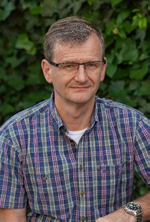Dr. André De Kesel, Meise Botanic Garden, Belgium

About Dr. André De Kesel: André is mycologist and researcher at Meise Botanic Garden (Belgium) since 1997. He studies mainly tropical African fungi and focuses on systematics, phylogeny, ecology and taxonomy of ectomycorrhizal taxa (Cantharellales, Boletales, …). He is interested in ethnomycology, ecosystem services and methods delivering data for valorization and conservation. He has collaborated with most African mycologists and co-authored books and papers, as well as a website about wild edible fungi from tropical Africa (https://www.efta-online.org/). Being committed to capacity building, he has initiated or guided research activities in Benin (1997), Togo (2006) and DR Congo (2012). He supervised masters andPhD research of many African mycologists.
Topic of the plenary talk: African edible fungi and ecosystem services
Authors: De Kesel A. Yorou N.S, Kasongo B, Nyiongabo E, Milenge Kamalebo H, Degreef J.
Abstract of the talk: Across tropical Africa hundreds of wild edible fungi are collected for local trade and consumption. In spite of this, fungal habitats (mostly woodland), suffer from increasing anthropogenic pressure. Due to a lack of information, wild edible fungi are still considered far less valuable than timber or charcoal. In this contribution we’ll outline the potential of African edible fungi, highlighting aspects of sustainable use, local economy, forest conservation, traditional knowledge and its preservation. We show the need for an interdisciplinary approach to value wild edible fungi. The subject is complex because in its qualitative part, all fungal taxa, their habitats and hosts, need to be understood. In its quantitative part, sporocarp productions and factors affecting them need to be recorded in permanent forest plots; which requires time and local stability. To finally also determine whether wild edible fungi should be used for exploitation, the local interest needs to be established with ethnomycological surveys. Based on such an integrated approach conducted in Benin, Burundi and DR Congo, we obtain science evidence that wild edible fungi are a far more valuable resource than generally accepted. Because many wild edible fungi are ectomycorrhizal, sustainable exploitation and forest conservation are often linked. In this talk we’ll discuss some factors that make or break this link.
Key words: ethnomycology, sustainable use, macrofungi, conservation, NTFP, Africa.
